US Senate Subcommittee to Release Report on 'Mistreatment' by Private Military Housing Contractors
Subscribe
Nearly all homes on military installations in the US are owned and operated by private contractors, not the US government, thanks to a 1996 law intended to help the military improve base life. Instead, it created a situation ripe for abuse, with dilapidated housing becoming commonplace.
The top two members of the Permanent Subcommittee on Investigations, part of the Senate’s Homeland Security and Governmental Affairs Committee, said on Tuesday they planned to soon release their findings from months of probing reports of abuse of military families by the privately-owned contractors who operate base housing.
“For eight months, we have investigated the mistreatment of military families in privatized housing on US bases,” committee chair Sen. Jon Ossoff (D-GA) said in a statement about his joint investigation with Sen. Ron Johnson (R-WI), the committee’s ranking member. “On Tuesday we will release findings, hear directly from America’s heroes, and question those responsible for their housing.”
“Service members represent the finest among us. They and their families make many sacrifices in service to this great nation,” Johnson added. “When stationed in US military installations, these men and women do not deserve to live in conditions that may damage the health and safety of themselves and their families.”
On April 26, Ossoff will hold his first public hearing as chairman of the committee. A freshman lawmaker who only took office in January 2021, Ossoff was immediately catapulted to head of the PSI, a subcommittee notorious for its use in the 1950s by former Sen. Joseph McCarthy (R-WI) to carry out his now-eponymous hearings accusing American officials of secretly being communists. The subcommittee was also once the weapon of Sen. Carl Levin (D-MI), who in the aftermath of the 2008 financial crash terrorized the corporate world with often-hostile probes of their business misconduct that contributed to the crash.
An investigation in 2019 by Reuters blew the lid on the story, revealing widespread problems with fudged numbers and reports, lead contamination of water, pests, and toxic black mold. The situation gained the attention of federal lawmakers, who denounced the conduct.
“Are any of them not acting like slumlords at this point? Are any of them doing a good job?” said then-Sen. Martha McSally (R-AZ), a former US Air Force fighter pilot, at a December 2019 hearing. “This pisses me off.”
According to a recent report by the Government Accountability Office (GAO) congressional watchdog, 99% of homes on military installations in the US are owned and operated by private housing companies that contract with the Pentagon. The agency said it’s been hounding the Pentagon since 2018 to improve oversight of these companies, and while that oversight has improved, it seems many landlords have the military over a barrel and have simply refused to accept new terms in their contracts.
Last December, one major housing provider, Balfour Beatty Communities LLC, pleaded guilty to a scheme to defraud the Pentagon by lying about improvements so it could pocket performance improvement incentive fees. The company agreed to pay more than $65 million in fines and restitution.
“Instead of promptly repairing housing for US servicemembers as required, BBC lied about the repairs to pocket millions of dollars in performance bonuses,” Deputy Attorney General Lisa Monaco said in a Department of Justice news release. “This pervasive fraud was a consequence of BBC’s broken corporate culture, which valued profit over the welfare of servicemembers. Today’s global resolution sends a clear message to companies that if they do not maintain adequate compliance programs, voluntarily self-disclose misconduct, and fully cooperate with the government, they will pay a price that outweighs the profits they once reaped.”
After, the Department of the Navy, which includes the US Navy and US Marine Corps, began conducting health and safety inspections of more than 62,000 base houses on a schedule, departing from an early policy of conducting inspections only upon request.

